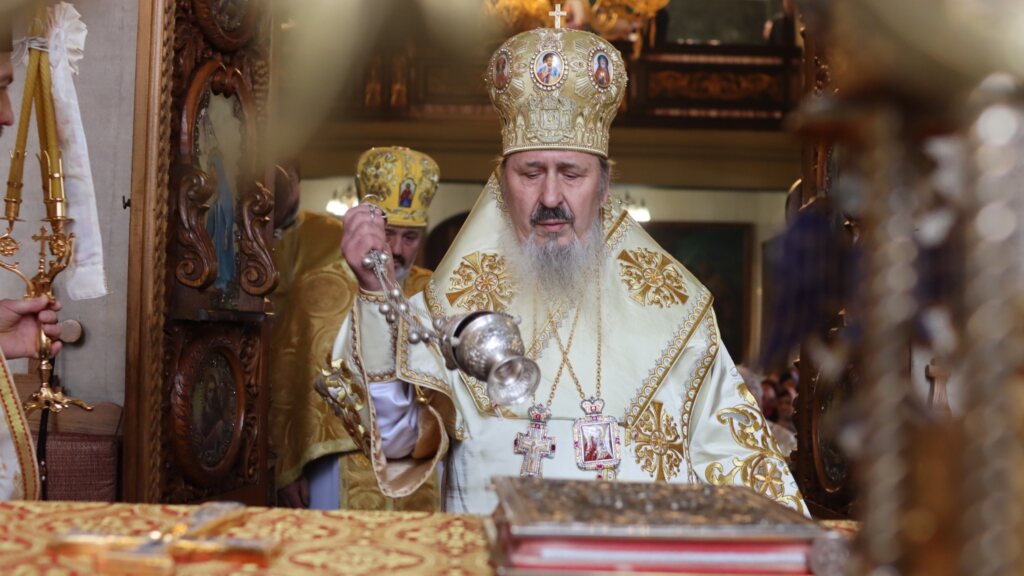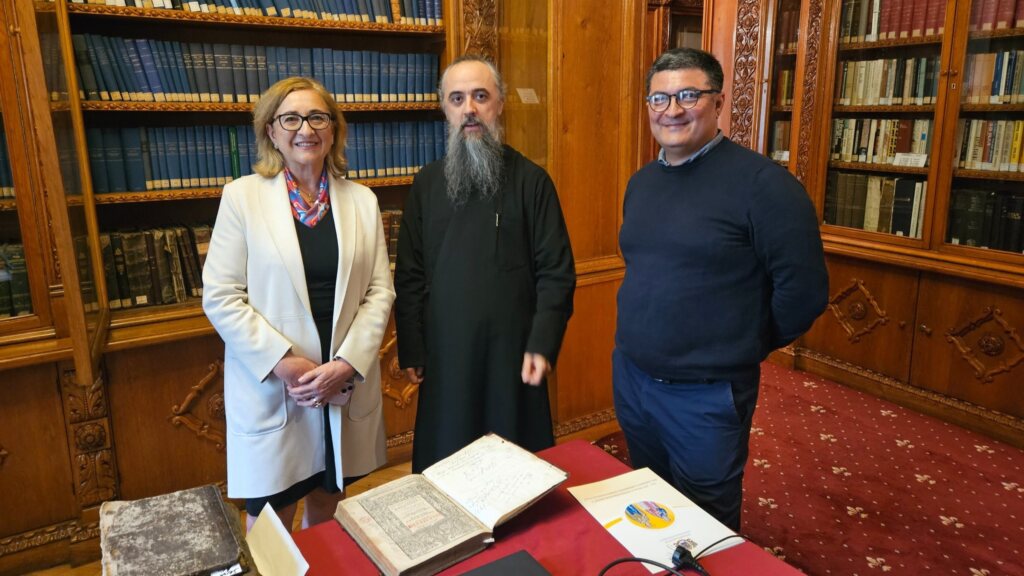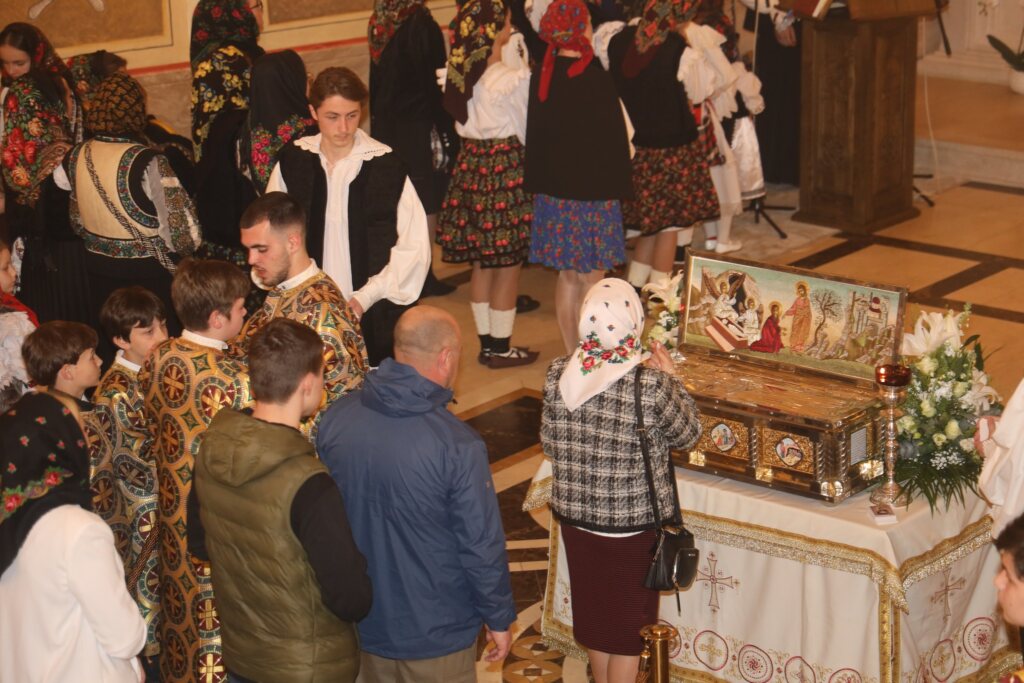On 14 August 2016, the 6th Sunday after Pentecost, the Bible text on the Multiplication of the Bread by Jesus Christ, our Saviour, was read (Matthew 14:14-22).
The Patriarch of Romania delivered a sermon in the historical chapel of the Patriarchal Residence in which he emphasised the teaching of this Gospel text. His Beatitude explained, among other things, that the social – philanthropic work of the Church is rooted in the Gospel of Jesus Christ, our Saviour.
We learn from the Gospel text of the day that we must spiritually feed the soul first, and then try to heal the body and find food for body. Secondly, we must learn that the social-philanthropic work of the Church has been developed from the Gospel of Christ and from the Divine Eucharistic Liturgy. Thirdly, we learn from the Gospel text of the day that the blessed gifts brought by some people to the church become joy for the entire community. Fourthly, we learn that these spiritual meanings of the Gospel text read today entered into the tradition of the Church in a liturgical form and as personal responsible behaviour, as well as into the behaviour of the Christian who enjoys the blessing of God and appreciates the gifts received from Him, His Beatitude said.
The soul has priority because it is eternal, but the body should not be neglected either, the Patriarch of the Romanian Orthodox Church also said.
The spiritual food has priority because the human being is, first of all, a spiritual, rational, free, and loving being. Although he has a body and is living on earth, the human being is first of all a spiritual and then a biological being. This priority of the soul compared to the body is also caused by the fact that man’s soul is eternal, created in the image of the eternal God and called to life, to the eternal communion of love with God. The body has become mortal through its separation from the body because of sin. This is why the body is called to sanctification, but this is done first as sanctification of the soul. Thus, the sanctified soul transmits the blessing and sanctification of God to the body too, and so, the mortal body is preparing for the universal resurrection on the Last Day. The Gospel shows that the body should not be despised, but taken care of and this is why the Saviour tells the Disciples in the evening: “You give them something to eat.”
The Church learned from Jesus Christ to be merciful on the hungry, thirsty, and distressed.
Thus, besides the spiritual work of preaching the Gospel, of celebrating the Divine Liturgy, in history, a charitable work has also developed which means the merciful love of the Church for the poor as inspiration and continuation of the merciful love of Christ for those in need. At the same time with the Eucharistic Liturgy, the social philanthropy has been developed since the early centuries. Thus, the Church does not separate the social work from the spiritual one and neither does limit the spiritual work only to prayer, but develops it in action too, in the good, merciful deed, stemmed from the humble and generous love, Patriarch Daniel explained.
The gifts brought to the church are blessed and multiplied, the Patriarch of the Romanian Orthodox Church has also underlined.
The Gospel shows us that the little food the Apostles found at a child in the crowd, five loaves and two fish, has been multiplied when it was blessed by Christ and caused great joy to the crowd who have come to listen to Christ, to bring the sick ones to Him, to strengthen their faith and find a sense of their lives. Very significant is the fact that the five loaves and two fish belonged to a family, but at the Saviour’s request they were given to the community so that the little food has become joy for the entire crowd. This shows us that this little gift makes the basis of the blessing given by the Saviour.
The multiplication of the bread and fish shows us that the blessing of God is done as a reply to the generosity of some people and that any gift offered in His name is blessed, multiplied and brings joy not only to those who offered it, but to the entire community. This is why the Church blesses the gifts brought by some faithful to the church and by sharing them they become joy for the entire community. Thus, we learn that the Church is joy generated by the gifts blessed by Christ.
The miracles of Jesus Christ, our Saviour, are signs of His merciful love, the Patriarch of Romania also said.
They are not made to impress, intimidate, frighten the people, to impose Himself or be praised, but all the miracles of Jesus Christ, our Saviour, are generated by His merciful love for humans. When He multiplied the five loaves and two fish, Jesus Christ, our Saviour did not make piles of loaves and fish, but they multiplied while they were given to the hungry people. In other words, the multiplication, as a result of the blessing, has a certain purpose: offering for growing in the communion of love of the community, for strengthening in faith the people who receive the gift, and for strengthening the community in brotherly love.
His Beatitude Patriarch Daniel also pointed out the fact that the Multiplication of bread represents an anticipation of the Holy Eucharist.
This Gospel text also shows us something of the Sacrament of the Holy Eucharist because when the bread and wine are blessed to become the Body and Blood of the Lord the priest says: „Broken and distributed is the Lamb of God, broken, yet not divided; ever eaten, though never consumed, but sanctifying them that partake thereof”.
We receive a little bit of the Holy Eucharist, but not a bit of Christ, but the entire Christ, because the Saviour says: “Whoever eats my flesh and drinks my blood remains in me, and I in them” (John 6:56). We communicate with something, but in fact we unite with Somebody, with the eternal Person of Christ.
Photo: “Lumina” newspaper






